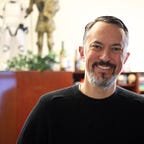The Aims of an Education
Remarks given to the students of the Residential College at West Ambler Johnston, Virginia Tech in August 2014, immediately before the formal “Aims of Education” address by President of Virginia Tech, Timothy D. Sands.
First, let me thank all of you for being here with us today:
— my wife, Rachel, and son, Ulysses;
— honored guests from across the university community;
— and last, but absolutely not least, the faculty, staff, and junior fellows of the Residential College at West Ambler Johnston – the houses of Hawthorn, Hickory, Holly, and Honey Locust. Twenty-nine faculty from 20 different academic units and 5 different colleges, nearly a dozen colleagues from Student Affairs and Housing & Residence Life, 4 graduate students each from a different program, and 850 undergraduates from every conceivable academic program in this university. This is the Residential College at West Ambler Johnston.
And now I invite the junior fellows – those who are wearing their house T-shirts – to look down. You’re wearing your house colors (blue for Hawthorn, green for Hickory, red for Holly, and yellow for Honey Locust). You’re distinct, sitting separately in your houses, some with old friends, some with new friends. But look down at the front of your shirt; every one of you will see the same thing. You’ll see the college crest. And under that, you’ll see a Latin motto – “vera universitas.”
Most often, we’d translate that short phrase as “true university.” But as a medievalist, I’m going to ask you to think a bit more “medieval” about that phrase. Now, I don’t want you to Pulp Fiction each other, or start swinging battleaxes. Instead, what I’m asking you to do is to think historically, contextually. Because when those 2 words were put together for the first time – maybe in Paris, on the Left Bank, sometime shortly before the year 1200 – they didn’t mean that at all. They couldn’t mean that. There was no such thing as a university. What there was, was a loose collection of students and teachers who wanted the freedom to pursue their studies – to share their intellectual inquiry. And when that shared intellectual pursuit was threatened (ironically enough – and I’m not making this up – after a night of heavy drinking that led to a riot in the streets of Paris), the students and teachers TOGETHER manned the barricades in solidarity.
Literally.
They literally armed themselves with swords and spears and built walls among the narrow streets of the Left Bank.
But, more importantly, they swore an oath to each other. And what that oath created was the first universitas – a “vera universitas.” Not a “true university,” because, again, that didn’t exist in the modern sense yet. Their “vera universitas” was, and I would suggest to you all today, our “vera universitas” is, instead better translated as “a real community.” A community dedicated to learning, to inquiry, to the search and the discovery. In the later Middle Ages, this new universitas blazed new ways of knowing, new ways of thinking, that opened up new intellectual spaces and allowed for the creation of a New World. And it did so mostly by asking questions – but even more by creating a space (both physical and intellectual) where conversation, discussion, and debate could occur safely. Where information becomes knowledge. Where opinion becomes analysis, and belief becomes conclusion.
This is modeled at our modern university, particularly here at Virginia Tech, and particularly in the Residential College. In the Residential College, we, both teacher and student alike, inhabit the same spaces – again, both physical and intellectual. Here, in the Residential College at West Ambler Johnston, you’ll find questions. Here, you’ll find discussion. Here, you’ll find analysis. And here, you’ll ultimately find more questions that you’ll take with you beyond this physical and intellectual space – to create your own, new ones. This, this process, this journey, and the people you travel with are the “vera universitas” you see on your shirt. The questions we ask of ourselves, of each other, of the world are what make us both a “true university,” as well as a “real community.”
